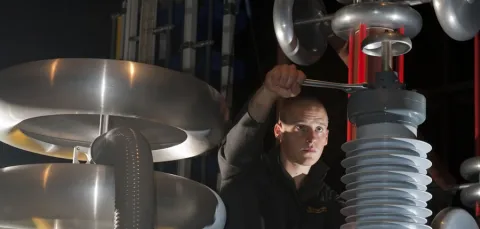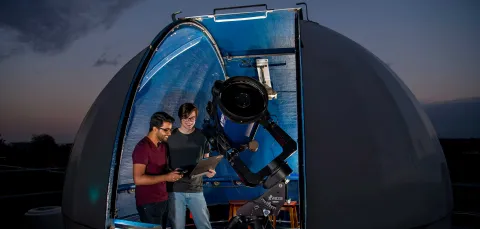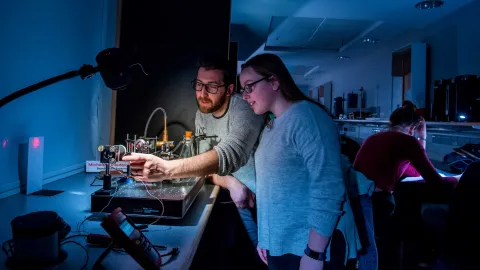About this course
This optical engineering course covers the fundamental concepts of modern optical and photonic engineering. It is based at the Optoelectronics Research Centre (ORC), which specialises in lasers, optical fibres, optical waveguides, and their applications in real world engineering. We focus on physical optics in settings such as communications, computing and sensors.
You'll work in photonics with access to professional level equipment, software, and fabrication methodologies. This involves studying the principles of lasers, optical technology and the practical aspects of their design, fabrication, and applications. The opportunity to specialise in different areas of optoelectronics will also be available.
Our range of optional modules covers topics such as:
- optical communications
- silicon photonics
- optical sensors
- advanced laser techniques
If you wish to follow a particular theme, you may choose modules from other subject areas to match your interests, such as physics or computer science.
You'll also perform an experimental or theoretical research project, making use of the extensive facilities in our research laboratories. This includes the Mountbatten Clean Room complex.
Aims of the course
The aims of the programme are to:
- provide you with advanced knowledge of optical fibre and photonic technologies
- give you the opportunity to work in a research-led environment using state of the art facilities
- develop your research skills applicable to a career in research and development
- stimulate your interest in the subject using a variety of teaching and learning methods
We regularly review our courses to ensure and improve quality. This course may be revised as a result of this. Any revision will be balanced against the requirement that the student should receive the educational service expected. Find out why, when, and how we might make changes.
Our courses are regulated in England by the Office for Students (OfS).
Course lead
Your course leader is Bill Brocklesby. Over the last 10 to 15 years his research has centred around novel imaging and microscopy techniques using visible and X-ray light sources. Read Dr Bill Brocklesby's profile to find out more about his research interests and publications.
Learn more about these subject areas
Course location
This course is based at Highfield.
Awarding body
This qualification is awarded by the University of Southampton.
Download the Course Description Document
The Course Description Document details your course overview, your course structure and how your course is taught and assessed.
Entry requirements
You'll need a 2:1 undergraduate degree in a related subject such as:
- electronic engineering
- information engineering
- materials science
- optical engineering
- physics
- telecommunications
Find the equivalent international qualifications for your country.
Information for students who have studied in China
This programme only accepts applicants who have studied at an X1, X2, X3 or X4 institution.
English language requirements
If English isn't your first language, you'll need to complete an International English Language Testing System (IELTS) to demonstrate your competence in English. You'll need all of the following scores as a minimum:
IELTS score requirements
- overall score
- 6.5
- reading
- 6.0
- writing
- 6.0
- speaking
- 6.0
- listening
- 6.0
We accept other English language tests. Find out which English language tests we accept.
If you don’t meet the English language requirements, you can achieve the level you need by completing a pre-sessional English programme before you start your course.
Pre-masters
If you don’t meet the academic requirements, you can complete a pre-master's programme through our partnership with OnCampus. Learn more about the programmes available.
Recognition of professional experience
If you’ve been away from formal study for some time we’ll assess your relevant professional experience, your subject knowledge and your aptitude for learning.
Your application will be considered on individual merit and you may be asked to attend an interview.
Got a question?
Please contact us if you're not sure you have the right experience or qualifications to get onto this course.
Email: enquiries@southampton.ac.uk
Tel: +44(0)23 8059 5000
Course structure
Your studies will run for a full 12 months, from September to the following September. The first 8 months cover taught modules and the completion of your coursework and examinations. For the final part of your studies you'll work on a research project, which will result in your dissertation. There are 2 sets of exams, in January and in May.
Your learning will be led by the latest research, and modules can change periodically to reflect developments in the discipline.
Semester 1 overview
Four compulsory modules covering the basics of:
- lasers
- optical fibres and waveguides
- optical materials and device fabrication
- practical signal processing in optics
Assessment of these lecture based modules is through a mixture of coursework and written examinations.
Semester 2 overview
You must complete a compulsory lab based module that covers practical topics important to photonic systems, such as fibres or lasers. This module is assessed through laboratory reports, and a conference style presentation.
The rest of the semester consists of 3 option modules. At least 2 of these must be from within the Optoelectronics Research Centre. One option can also be taken outside of the school.
Research project
After you have completed the first 2 semesters, you will undertake a research project lasting around 15 weeks. This can involve cleanroom and optical laboratory work.
Your project is assessed by a:
- midterm (7 week) progress report of 2,500 words
- 15,000 word dissertation
- conference style group presentation
Your dissertation is due by the middle of September. After you submit your dissertation, you will present the main achievements of your research project work to your peers in a conference style setting.
Want more detail? See all the modules in the course.
Modules
The modules outlined provide examples of what you can expect to learn on this degree course based on recent academic teaching. As a research-led University, we undertake a continuous review of our course to ensure quality enhancement and to manage our resources. The precise modules available to you in future years may vary depending on staff availability and research interests, new topics of study, timetabling and student demand. Find out why, when and how we might make changes.
For entry in academic year 2025 to 2026
Year 1 modules
You must study the following modules :
Lasers
Lasers and photonic techniques are used in all branches of science and technology. The principles of laser operation will be discussed, with reference to commonly used laser systems. The course provides knowledge of the laser as a fundamental tool of cont...
Optical Fibres and Waveguides
An optical waveguide is the fundamental building block in photonics and in-depth knowledge of waveguides as a light guiding medium is vital for understanding a number of photonic devices, circuits and systems. This module will introduce the fundamentals o...
Photonic Materials and Device Platforms
Photonics Laboratory and Study Skills
The course is devoted to carrying out a series of experiments from the area of photonics and related technologies. The experiments have been selected to underpin and illustrate some fundamental concepts in laser and fibre science and offer an opportunity ...
Project
The topics of research projects will cover different concepts in photonic materials and in design, fabrication and testing of device-oriented applications in photonic technology. Each student will work under a supervision of a senior research/academic ...
Signal Processing and Machine Learning in Photonics
This module will introduce the student to a toolkit of techniques for signal processing for use in photonics. Many of the topics students will study in Photonics will rely on an understanding of how optical signals are acquired and processed – the connect...
You must also choose from the following modules :
Advanced Fibre Telecommunication
Communications is arguably the most widespread application of fibre optics, and naturally forms an essential part of an MSc Programme specialising on fibre technologies. This module will cover topics ranging from the more general (aimed at students with a...
Advanced Lasers
The operating principles of a wide variety of solid-state lasers will be covered, as well as practical implementations and uses. Solid state lasers in various formats (e.g. bulk/crystal, fibre, ultrafast) are used in many branches of science and technolog...
Nanoscience: technology and advanced materials
This course aims to provide you with an insight into some of the current research in nanoscience and an understanding of the underlying nanophysics. The field of nanoscience is multidisciplinary covering materials science, photonics, chemistry and biology...
Optical Sensors
Optical sensor technology is playing an increasing role in modern-day life with a range of applications emerging in areas spanning civil engineering, defence and the life sciences. This module focuses on a key area of ORC expertise that has developed in p...
Quantum Information
Quantum information combines information science with quantum effects in physics to study of how to process and transmit information using quantum systems. This includes quantum computation, quantum teleportation and quantum cryptography. Quantum metrol...
Silicon Photonics
The course will present an introduction to guided waves, optical modes, and propagation characteristics of photonic circuits, using Silicon Technology by way of example.
Wireless and Mobile Networks
The module consists of the following 8 components: 1. Introduction; 2. Data link layer; 3. Medium access control sublayer; 4. Network layer; 5. Queueing theory and queueing models; 6. Cellular wireless networks; 7. Wireless local area networ...
Learning and assessment
Learning
You'll learn through a variety of methods, including:
- classes and tutorials
- delivering presentations
- coursework
- individual and group projects
- independent learning (studying on your own)
Assessment
We'll assess you through:
- exams
- coursework assignments
- presentations
- reports and portfolios
- projects
Dissertation
This course requires a final project dissertation with a maximum of 15,000 words, and a conference style final project presentation to all the students on the programme.
Academic Support
Towards the end of semester 2, you will be allocated a project supervisor with whom you will meet and agree a project brief and plan. These must be submitted to and agreed by the project coordinator. During the summer you will have weekly meetings with your supervisor or, if your supervisor is unavailable, another researcher within the group.
The Student Support Hub can help with your questions or concerns about your wellbeing, fees and funding, accommodation, or visas.
Visit the Student Support Hub.
You will also be allocated a Personal Academic Tutor, who will offer one to one support and advice throughout your time at Southampton. They will support you in your studies or with other issues you may have.
Careers and employability
Employability skills
This degree will allow you to develop and evidence subject-specific and targeted employability skills. This includes the required skill set for a range of future careers, further study, or starting your own business.
The skills you can expect to focus on and gain from this course include:
- Research
- Critical thinking
- Commercial awareness
- Self-management
- Communication
- Problem solving
The employability and enterprise skills you'll gain from this course are reflected in the Southampton skills model. When you join us you'll be able to use our skills model to track, plan, and benefit your career development and progress.
Download skills overview
Career pathways
Graduates commonly work in a range of organisations or sectors including:
Information and Communication,
Manufacturing,
Education,
Public Administration and Defence,
Scientific and Technical,
Administration and support.
- Optical engineer
- Optical design engineer
- Photonics development engineer
- Laboratory manager
- Clinical scientist
- Optical communications engineer
- Technical sales manager
- Consultant
- Data engineer
- Patent attorney
- Technical project manager
- University lecturer
- Consultant
- Optical engineer
- Secondary school teacher
- Medical sales specialist
- Software engineer
- Lecturer

Work experience opportunities
Choosing to do work experience is a great way to enhance your employability, build valuable networks, and evidence your potential. Learn about the different work and industry experience options at Southampton.
Careers services and support
We are a top 20 UK university for employability (QS Graduate Employability Rankings 2022). Our Careers, Employability and Student Enterprise team will support you. This support includes:
- work experience schemes
- CV and interview skills and workshops
- networking events
- careers fairs attended by top employers
- a wealth of volunteering opportunities
- study abroad and summer school opportunities
We have a vibrant entrepreneurship culture and our dedicated start-up supporter, Futureworlds, is open to every student.
Your career ideas and graduate job opportunities may change while you're at university. So it is important to take time to regularly reflect on your goals, speak to people in industry and seek advice and up-to-date information from Careers, Employability and Student Enterprise professionals at the University.
Fees, costs and funding
Tuition fees
Fees for a year's study:
- UK students pay £9,250.
- EU and international students pay £32,800.
Deposit
If you're an international student on a full-time course, we'll ask you to pay £2,000 of your tuition fees in advance, as a deposit.
Your offer letter will tell you when this should be paid and provide full terms and conditions.
Find out about exemptions, refunds and how to pay your deposit on our tuition fees for overseas students page.
What your fees pay for
Your tuition fee covers the full cost of tuition and any exams. The fee you pay will remain the same each year from when you start studying this course. This includes if you suspend and return.
Find out how to pay your tuition fees.
Accommodation and living costs, such as travel and food, are not included in your tuition fees. There may also be extra costs for retake and professional exams.
Explore:
10% alumni discount
If you’re a graduate of the University of Southampton, you could be eligible for a 10% discount on your postgraduate tuition fees.
Southampton Photonics Impact Scholarship
Three £15,000 scholarships are available to international students planning to study MSc Optical Engineering at the University of Southampton.
Find out more about the Southampton Photonics Impact Scholarship, including eligibility, deadlines and how to apply.
Other postgraduate funding options
A variety of additional funding options may be available to help you pay for your master’s study. Both from the University and other organisations.
Funding for EU and international students
Find out about funding you could get as an international student.
How to apply
- Use the blue 'apply for this course' button on this page to take you to our postgraduate admissions system.
- Create an account which gives you access to your own application portal. .
- Search for the course you want to apply for.
- Complete the application form and upload any supporting documents.
- Pay the £50 application assessment fee, (there are some exemptions, check terms and conditions).
- Submit your application.
For further details of our admission process, read our step by step guide to postgraduate taught applications.
Application deadlines
- International students who require an ATAS: Tuesday 29 July 2025, midday UK time
- International students who do not require an ATAS: Tuesday 26 August 2025, midday UK time
- UK students: Tuesday 9 September 2025, midday UK time
Application assessment fee
We’ll ask you to pay a £50 application assessment fee if you’re applying for a postgraduate taught course.
This is an extra one-off charge which is separate to your tuition fees and is payable per application. It covers the work and time it takes us to assess your application. You’ll be prompted to pay when you submit your application which won’t progress until you've paid.
If you're a current or former University of Southampton student, or if you’re applying for certain scholarships, you will not need to pay the fee. PGCE applications through GOV.UK and Master of Research (MRes) degree applications are also exempt. Find out if you’re exempt on our terms and conditions page.
Supporting information
When you apply you’ll need to submit a personal statement explaining why you want to take the course.
You’ll need to include information about:
- your knowledge of the subject area
- why you want to study a postgraduate qualification in this course
- how you intend to use your qualification
References are not required for this programme.
Please include the required paperwork showing your first degree and your IELTS English language test score (if you are a non-native English speaker) with your application. Without these, your application may be delayed.
You may also be asked to provide:
- a degree transcript
- evidence of professional qualifications
What happens after you apply
You'll be able to track your application through our online Applicant Record System.
We will aim to send you a decision 6 weeks after you have submitted your application.
Unfortunately, due to number of applications we receive, we may not be able to give you specific feedback on your application if you are unsuccessful.
Equality and diversity
We treat and select everyone in line with our Equality and Diversity Statement.
Got a question?
Please contact us if you're not sure you have the right experience or qualifications to get onto this course.
Email: enquiries@southampton.ac.uk
Tel: +44(0)23 8059 5000





